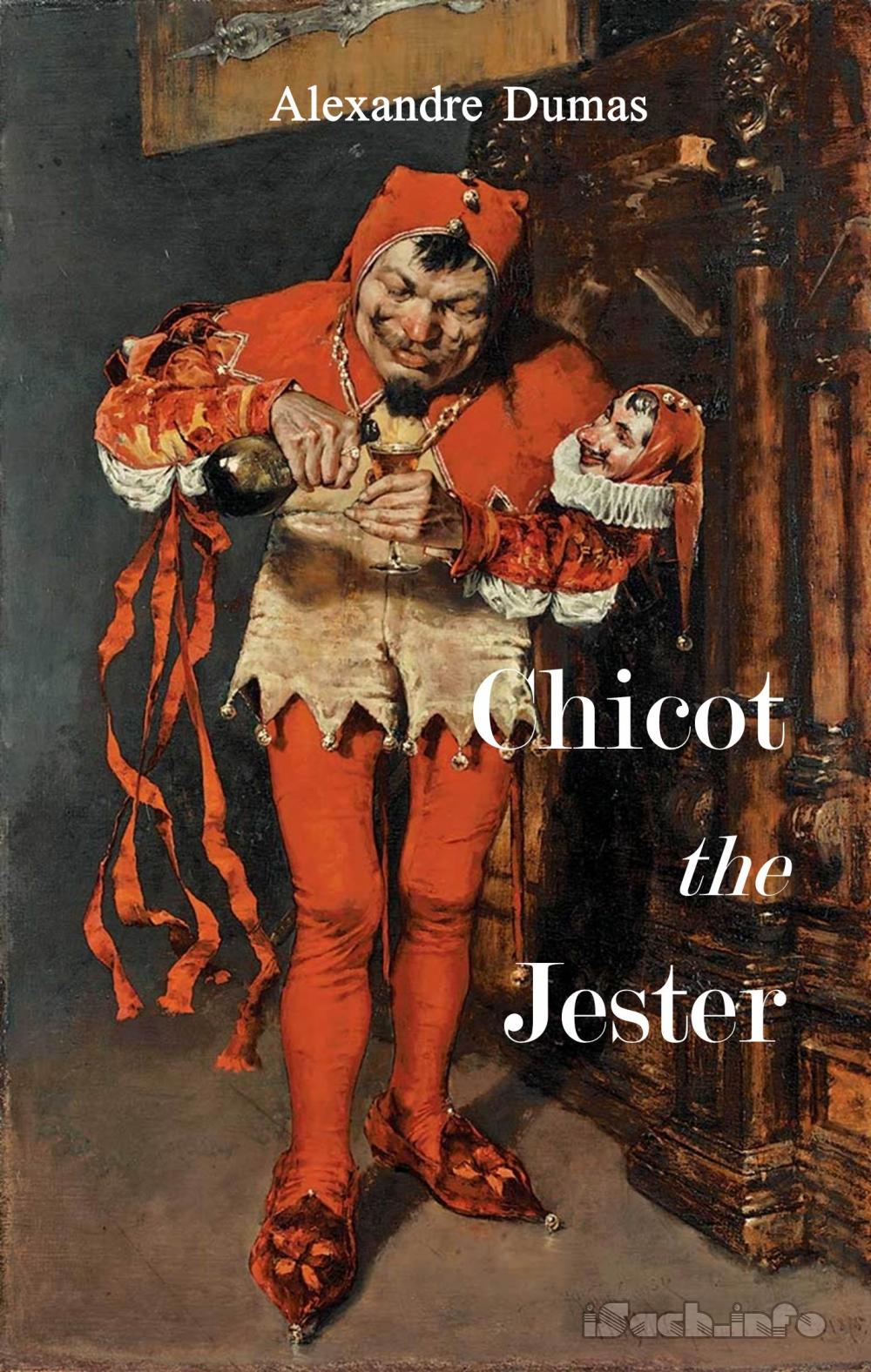Chapter 19: How Chicot Found Out That It Was Easier To Go In Than Out Of The Abbey
C
hicot, from the cloak and other things under the monk's robe, looked much larger across the shoulders than usual. His beard was of the same color as Gorenflot's, and he had so often amused himself with mimicking the monk's voice and manner of speaking that he could do it perfectly. Now, everyone knows that the beard and the voice are the only things which are recognizable from under the depths of a monk's hood. Chicot exhibited his coin, and was admitted without difficulty, and then followed two other monks to the chapel of the convent. In this chapel, built in the eleventh century, the choir was raised nine or ten feet above the rest of the building, and you mounted into it by two lateral staircases, while an iron door between them led from the nave to the crypt, into which you had to descend again. In this choir there was a portrait of St. Geneviève, and on each side of the altar were statues of Clovis and Clotilda.Three lamps only lighted the chapel, and the imperfect light gave a greater solemnity to the scene. Chicot was glad to find that he was not the last, for three monks entered after in gray robes, and placed themselves in front of the altar. Soon after, a little monk, doubtless a lad belonging to the choir, came and spoke to one of these monks, who then said, aloud,—
"We are now one hundred and thirty-six."
Then a great noise of bolts and bars announced that the door was being closed. The three monks were seated in armchairs, like judges. The one who had spoken before now rose and said—
"Brother Monsoreau, what news do you bring to the Union from the province of Anjou?"
Two things made Chicot start, the first was the voice of the speaker, the second the name of Monsoreau, known to the court only the last few days. A tall monk crossed the assembly, and placed himself in a large chair, behind the shadow of which Chicot had kept himself.
"My brothers," said a voice which Chicot recognized at once as that of the chief huntsman, "the news from Anjou is not satisfactory; not that we fail there in sympathy, but in representatives. The progress of the Union there had been confided to the Baron de Méridor, but he in despair at the recent death of his daughter, has, in his grief, neglected the affairs of the league, and we cannot at present count on him. As for myself, I bring three new adherents to the association. The council must judge whether these three, for whom I answer, as for myself, ought to be admitted into the Union."
A murmur of applause followed and as Monsoreau regained his seat,—"Brother la Hurière," cried the same monk, "tell us what you have done in the city of Paris."
A man now took the chair and said, "My brothers, you know I am devoted to the Catholic faith, and I have given proofs of this devotion on the great day of its triumph. Yes, my brothers, I glory in saying that I was one of the faithful of our great Henri de Guise, and that I followed his orders strictly. I have now noted all the heretics of the Quartier St. Germain l'Auxerrois, where I shall hold the hotel of the Belle-Etoile, at your service, my brothers. Now, although I no longer thirst for the blood of heretics as formerly, I do not delude myself as to the real object of the holy Union which we are forming. If I am not deceived, brothers, the extinction of private heretics is not all we aim at. We wish to be sure that we shall never be governed by a heretic prince. Now, my friends, what is our situation? Charles IX., who was zealous, died without children; Henri Ill. will probably do the same, and there remains only the Duc d'Anjou, who not only has no children either, but seems cold towards us."
"What makes you accuse the prince thus?" said the monk who always spoke.
"Because he has not joined us."
"Who tells you so, since there are new adherents?"
"It is true; I will wait; but after him, who is mortal, and has no children, to whom will the crown fall? To the most ferocious Huguenot that can be imagined, to a renegade, a Nebuchadnezzar?" Here the acclamations were tremendous.
"To Henri of Béarn," continued he, "against whom this association is chiefly directed—to Henri, who the people at Pau, or Tarbes, think is occupied with his love affairs, but who is in Paris!"
"In Paris! impossible!" cried many voices.
"He was here on the night when Madame de Sauve was assassinated, and perhaps is here still."
"Death to the Béarnais!" cried several.
"Yes, doubtless, and if he came to lodge at the Belle-Etoile, I answer for him; but he will not come. One does not catch a fox twice in the same hole. He will lodge with some friend, for he has friends. The important thing is to know them. Our union is holy, our league is loyal, consecrated and blessed by the Pope; therefore I demand that it be no longer kept secret, but that we go into the houses and canvass the citizens. Those who sign will be our friends, the others our enemies, and if a second St. Bartholomew come, which seems to the faithful to be more necessary daily, we shall know how to separate the good from the wicked."
Thunders of acclamation followed. When they were calm, the monk who always spoke said,—
"The proposition of Brother la Hurière, whom the union thanks for his zeal, will be taken into consideration by the superior council."
La Hurière bowed, amidst fresh applause.
"Ah! ah!" thought Chicot, "I begin to see clearly into all this. The Guises are forming a nice little party, and some fine morning Henri will find that he has nothing left, and will be politely invited to enter a monastery. But what will they do with the Duc d'Anjou?"
"Brother Gorenflot," then cried the monk.
No one replied.
"Brother Gorenflot," cried the little monk, in a voice which made Chicot start; for it sounded like a woman's. However, he rose, and speaking like the monk, said,—
"Here I am; I was plunged in profound meditation." He feared not to reply, for the members had been counted, and therefore the absence of a member would have provoked an examination. Therefore, without hesitation, he mounted the chair and began.
"My brothers, you know that I purvey for the convent, and have the right of entering every dwelling. I use this privilege for the good of religion. My brothers," continued he, remembering Gorenflot's beginning, "this day, which unites us, is a good one for the faith. Let us speak freely, my brothers, since we are in the house of God.
"What is the kingdom of France? A body. 'Omnis civitas corpus est.' What is the first requisite of a body? Good health. How do we preserve this? By prudent bleedings at times. Now it is evident that the enemies of our religion are too strong; we must therefore once more bleed that great body we call society. This is what is constantly said to me by the faithful, who give me ham, eggs, or money for the convent."
Several murmurs of approbation interrupted Chicot, then he went on.
"Some may object that the church abhors blood. But they do not say what blood, and I wager that it is not the blood of heretics it abhors. And then another argument; I said, 'the church;' but are we the church? Brother Monsoreau, who spoke so well just now, has, I doubt not, his huntsman's knife in his belt. Brother la Hurière manages the spit; I, myself, who speak to you—I, Jacques Gorenflot, have carried the musket in Champagne. It now remains to us to speak of our chiefs, of whom it seems to me, poor monk as I am, that there is something to say. Certainly, it is very well and prudent to come at night under a monk's robe, to hear Brother Gorenflot preach; but it appears to me that their duties do not stop there. So much prudence may make the Huguenots laugh. Let us play a part more worthy of the brave people we are. What do we want? The extinction of heresy. Well, that may be cried from the housetops, it seems to me. Why not march in holy procession, displaying our good cause, and our good partisans, but not like the thieves, who keep looking round them to see if the watch is coming. Who is the man who will set the example? Well, it is I, Jacques Gorenflot; I, unworthy brother of the order of St. Geneviève, poor and humble purveyor of the convent. It shall be I, who with a cuirass on my back, a helmet on my head, and a musket on my shoulder, will march at the head of all good Catholics who will follow me. This I would do, were it only to make those chiefs blush, who, while defending the Church, hide, as if their cause was a bad one."
This speech, which corresponded with the sentiments of many there, was received with shouts of applause; and the more so, as up to this time Gorenflot had never shown any enthusiasm for the cause. However, it was not the plan of the chiefs to let this enthusiasm proceed. One of the monks spoke to the lad, who cried in his silvery voice, "My brothers, it is time to retire; the sitting is over."
The monks rose, all determined to insist on the procession at the next meeting. Many approached the chair to felicitate the author of this brilliant speech; but Chicot, fearful of being recognized, threw himself on his knees and buried his head in his hands, as if in prayer. They respected his devotions, and went towards the door. However, Chicot had missed his chief aim. What had made him quit the king was the sight of M. de Mayenne and Nicolas David, on both of whom he had, as we know, vowed vengeance; and although the duke was too great a man to be attacked openly, Nicolas David was not, and Chicot was so good a swordsman as to feel sure of success if he could but meet him. He therefore began to watch each monk as he went out, and perceived to his terror that each, on going out, had to show some sign again. Gorenflot had told him how to get in, but not how to get out again.



 ePub
ePub A4
A4